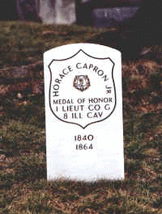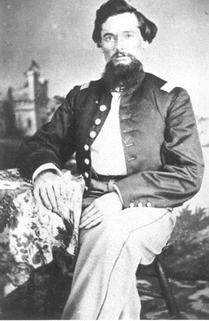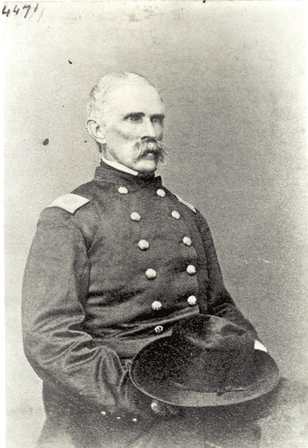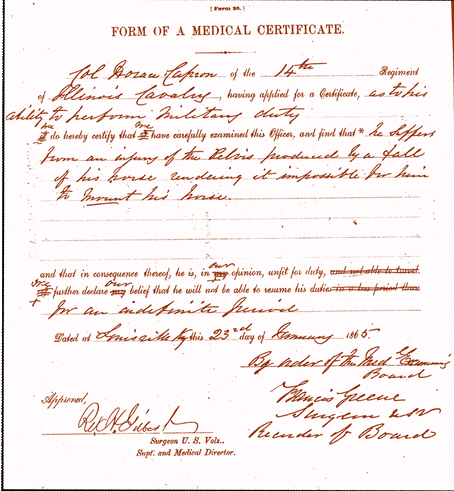Civil War
1860-1865
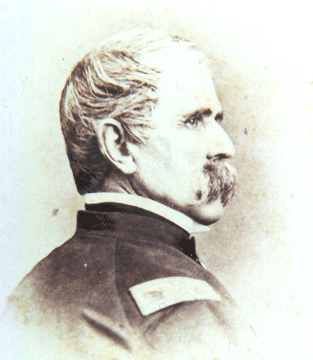 Horace Capron during the Civil War
Horace Capron during the Civil War
Horace was happily involved with his family and farm in Illinois when war broke out in 1861.
That fall, President Lincoln called for troops.
There was no hesitation on the part of either the father or the sons, to making the sacrifice…the two oldest-Horace and Albert then and there changed their pruning hooks for the spear…” HC Autobiography p. 135
Horace Sr. continued farming, but beginning in the summer of 1862 the call came: War Department Secretary Stanton asked for 3 year volunteers including cavalry units. Horace and others sought recruits for three regiments but only one could be raised. The result was the 14th Illinois Cavalry, formed in January 1863. Horace Capron, then in his 59th year, was named its Colonel. "
"In the contest for the command of the regiment Col. Capron won. The war Governor Richard Yates, preferred him to Jenkins or Hancock." Maj. Henry C. Connelly, Journal Ill. Hist. Soc. Jan. 1913 v. 5 #4, page 458.
Horace’s three sons: Horace Jr., Albert and Osmond eventually joined him in the regiment. The family would pay a high price for their dedication.
That fall, President Lincoln called for troops.
There was no hesitation on the part of either the father or the sons, to making the sacrifice…the two oldest-Horace and Albert then and there changed their pruning hooks for the spear…” HC Autobiography p. 135
Horace Sr. continued farming, but beginning in the summer of 1862 the call came: War Department Secretary Stanton asked for 3 year volunteers including cavalry units. Horace and others sought recruits for three regiments but only one could be raised. The result was the 14th Illinois Cavalry, formed in January 1863. Horace Capron, then in his 59th year, was named its Colonel. "
"In the contest for the command of the regiment Col. Capron won. The war Governor Richard Yates, preferred him to Jenkins or Hancock." Maj. Henry C. Connelly, Journal Ill. Hist. Soc. Jan. 1913 v. 5 #4, page 458.
Horace’s three sons: Horace Jr., Albert and Osmond eventually joined him in the regiment. The family would pay a high price for their dedication.
The 14th Illinois saw service from , Kentucky through Indiana, Ohio, Tennessee, North Carolina, Virginia, into Georgia
In March 1863 the regiment was sent to Kentucky to repulse raids by Confederate cavalry. In July 1863 it pursued Morgan’s Raiders from Kentucky into Indiana and Ohio. These Confederates were known and feared for their guerilla fighting tactics—and their dashing leader, John Hunt Morgan. July 26, 1863 the 14th Ill. participated in Morgan’s capture. (He later escaped.)
In March 1863 the regiment was sent to Kentucky to repulse raids by Confederate cavalry. In July 1863 it pursued Morgan’s Raiders from Kentucky into Indiana and Ohio. These Confederates were known and feared for their guerilla fighting tactics—and their dashing leader, John Hunt Morgan. July 26, 1863 the 14th Ill. participated in Morgan’s capture. (He later escaped.)
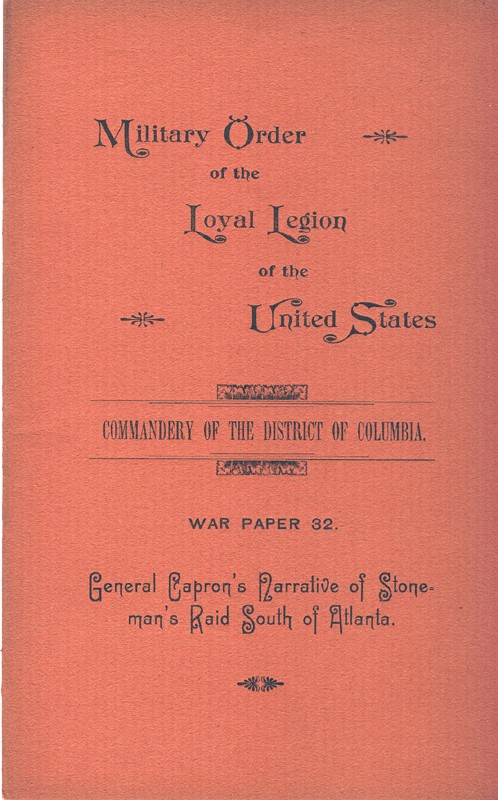 Cover of General Capron's Narrative of Stoneman's Raid South of Atlanta Collection of Ken Skrivseth/Karen Lubieniecki
Cover of General Capron's Narrative of Stoneman's Raid South of Atlanta Collection of Ken Skrivseth/Karen Lubieniecki
Stoneman's Raid
In July 1864 the 14th Ill. joined General Sherman’s Atlanta Campaign under General George Stoneman. Stoneman's campaign, known as Stoneman's Raid or the Battle of Sunshine Church was a military disaster and a disaster for Capron.
In late July, 1864, to cut off supplies to Atlanta, Sherman directed General Stoneman to advance his cavalry (including the 14th Ill) towards Macon, Georgia. They cut rail lines and destroyed supplies. As a result of Stoneman’s miscalculations, (and possible disregard for orders) the effort ended in disaster.
The massive cavalry group was nearly surrounded. Stoneman sacrificed his small central unit, surrendered July 31 at Sunshine Church, and was taken prisoner. Stoneman was the highest ranking Union officer captured during the war.
Capron’s regiment was able to withdraw—but faced chaos and disarray as it tried to regroup. In the battle's aftermath, Albert Capron was taken prisoner while fighting at Kings Tanyard. Horace and his 18 year-old son Osmond had a harrowing escape, but were eventually able to get back to the Union lines. They rode horses bareback, traveled down rapids, hid from pursuers in swamps, and were betrayed by their guide.
"...I was suddenly aroused by most unearthly yells and screams, mingled with pistol shots, directly over and all around us....I sprang for my horse, and called upon my son to keep by my side. An older son who was in advance was captured after a brave fight and taken to prison... General Capron’s Narrative of Stoneman’s Raid South of Atlanta. P. 22-23.
Liberating Andersonville was one objective of the Stoneman effort. Fear of Andersonville, which was nearby, was a compelling reason for escaping. Horace Capron in 1864 was well aware of its horrors.
"...I still proposed to take my chances of a sudden death from the enemy's bullets to a lingering one in their prisons, handicapped with the weight of sixty years, or for my boy of eighteen, in the stockade at Andersonville..." (General Capron’s Narrative of Stoneman’s Raid South of Atlanta. P. 24
“Voices of men, women and children could be heart at interviews, scouring the woods for union soldiers twice they passed so near us, as we lay upon our backs, that we saw their rifles and shot-guns, and even the hats and bonnets of these fiends....There appeared no other way to escape but to throw ourselves flat into the muddy ooze at the bottom and trust to chance” General Capron’s Narrative of Stoneman’s Raid South of Atlanta. P. 32
In July 1864 the 14th Ill. joined General Sherman’s Atlanta Campaign under General George Stoneman. Stoneman's campaign, known as Stoneman's Raid or the Battle of Sunshine Church was a military disaster and a disaster for Capron.
In late July, 1864, to cut off supplies to Atlanta, Sherman directed General Stoneman to advance his cavalry (including the 14th Ill) towards Macon, Georgia. They cut rail lines and destroyed supplies. As a result of Stoneman’s miscalculations, (and possible disregard for orders) the effort ended in disaster.
The massive cavalry group was nearly surrounded. Stoneman sacrificed his small central unit, surrendered July 31 at Sunshine Church, and was taken prisoner. Stoneman was the highest ranking Union officer captured during the war.
Capron’s regiment was able to withdraw—but faced chaos and disarray as it tried to regroup. In the battle's aftermath, Albert Capron was taken prisoner while fighting at Kings Tanyard. Horace and his 18 year-old son Osmond had a harrowing escape, but were eventually able to get back to the Union lines. They rode horses bareback, traveled down rapids, hid from pursuers in swamps, and were betrayed by their guide.
"...I was suddenly aroused by most unearthly yells and screams, mingled with pistol shots, directly over and all around us....I sprang for my horse, and called upon my son to keep by my side. An older son who was in advance was captured after a brave fight and taken to prison... General Capron’s Narrative of Stoneman’s Raid South of Atlanta. P. 22-23.
Liberating Andersonville was one objective of the Stoneman effort. Fear of Andersonville, which was nearby, was a compelling reason for escaping. Horace Capron in 1864 was well aware of its horrors.
"...I still proposed to take my chances of a sudden death from the enemy's bullets to a lingering one in their prisons, handicapped with the weight of sixty years, or for my boy of eighteen, in the stockade at Andersonville..." (General Capron’s Narrative of Stoneman’s Raid South of Atlanta. P. 24
“Voices of men, women and children could be heart at interviews, scouring the woods for union soldiers twice they passed so near us, as we lay upon our backs, that we saw their rifles and shot-guns, and even the hats and bonnets of these fiends....There appeared no other way to escape but to throw ourselves flat into the muddy ooze at the bottom and trust to chance” General Capron’s Narrative of Stoneman’s Raid South of Atlanta. P. 32
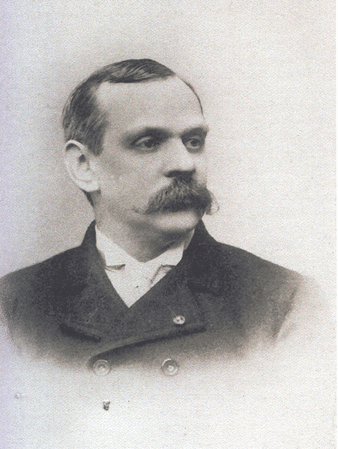 Albert Capron
Albert Capron
The Price of War
Horace Capron lost much during the war. Not only was his oldest son, Horace Jr., killed, but Albert served time in a Charleston prison of war camp. Osmond received a disability discharge, and may also have been in a prison."The second and third [Albert and Osmond] returned to me...with constitutions impaired from the exposures of the services and imprisonments in Rebel prisons." Horace Capron Autobiography, p. 140.
Horace Capron's wife, Margaret, was unable to manage the farm. Horace's autobiography suggests that hired help took advantage of her lack of farming experience. By the end of the war his beloved herd of Devon cattle and farm had been all but destroyed. Horace had to start over, again, at the age of sixty.
Horace Capron lost much during the war. Not only was his oldest son, Horace Jr., killed, but Albert served time in a Charleston prison of war camp. Osmond received a disability discharge, and may also have been in a prison."The second and third [Albert and Osmond] returned to me...with constitutions impaired from the exposures of the services and imprisonments in Rebel prisons." Horace Capron Autobiography, p. 140.
Horace Capron's wife, Margaret, was unable to manage the farm. Horace's autobiography suggests that hired help took advantage of her lack of farming experience. By the end of the war his beloved herd of Devon cattle and farm had been all but destroyed. Horace had to start over, again, at the age of sixty.
